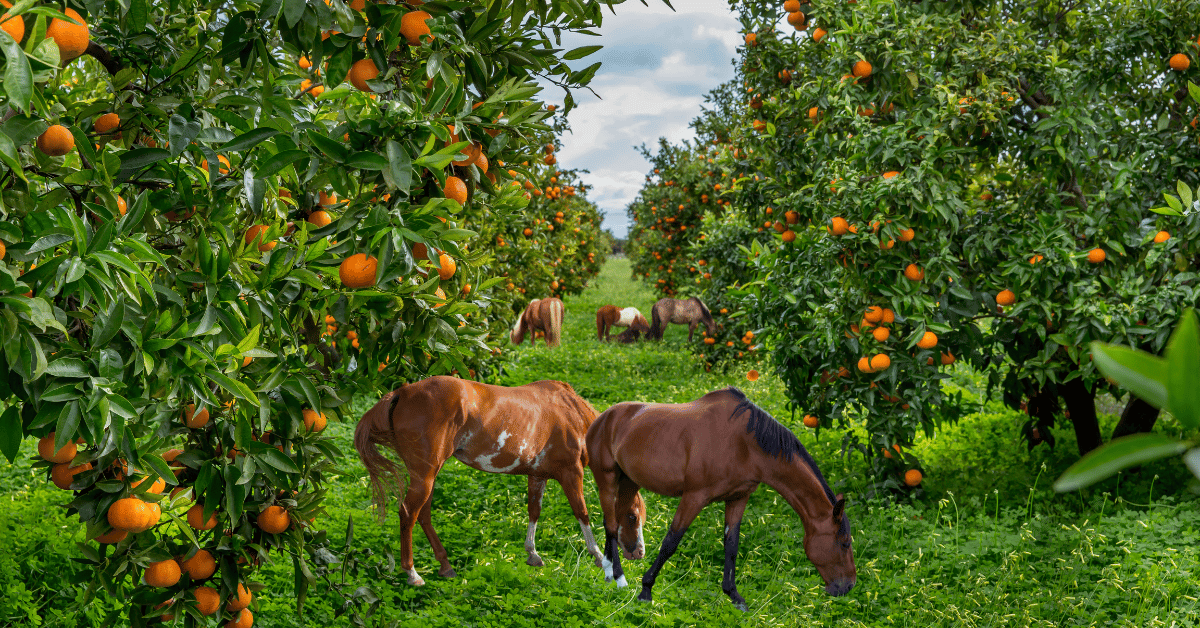If you’ve ever caught your horse eyeing your snack, you might wonder, do horses eat oranges, and is it safe to share? While oranges may seem like an unusual treat, they can actually be a refreshing and nutrient-rich snack for your equine friend when offered in moderation. Packed with vitamin C, oranges can provide a delightful burst of hydration and energy, especially during warmer months.
But feeding citrus isn’t without its precautions. Horses have sensitive digestive systems, and the acidity of oranges might not agree with every equine palate. Additionally, offering oranges in the wrong way—such as whole or unwashed—can pose risks like choking or pesticide exposure.
By understanding the benefits and learning how to safely prepare and portion oranges, you can add a zesty twist to your horse’s diet while keeping them healthy and happy. Let’s explore the ultimate guide to feeding oranges to horses!
Can Horses Eat Oranges?

Benefits of Oranges for Horses
Oranges can be a healthy treat for horses, providing a variety of nutrients and minerals beneficial to their health. These fruits are high in fiber, low in calories, and filled with water, making them an ideal snack for your equine friends (Strathorn Farm). Here are some of the benefits:
- Boosting the Immune System: Oranges contain antioxidants, including vitamin C, which helps in the development of antibodies to fight off diseases (Strathorn Farm).
- Hydration: The high water content in oranges helps keep horses hydrated, especially during hot weather.
- Dietary Fiber: The fiber in oranges aids digestion and supports a healthy gut.
It’s important to note that oranges should be considered a treat rather than a staple part of a horse’s diet. Starting with small amounts and gradually increasing allows owners to gauge their horses’ tolerance and enjoy the benefits while minimizing potential risks.
Nutrients in Oranges
Oranges are rich in essential nutrients that can contribute to a horse’s overall health. Here’s a look at the key nutrients found in oranges:
| Nutrient | Benefit for Horses |
|---|---|
| Vitamin C | Supports the immune system |
| Fiber | Aids digestion |
| Potassium | Crucial for heart health |
| Calcium | Promotes strong bones and teeth |
| Hesperidin | Helps in blood circulation during exercise (Strathorn Farm) |
These nutrients make oranges a valuable addition to a horse’s diet, provided they are given in moderation and with proper precautions.
Moderation and Precautions
While feeding horses oranges can offer numerous benefits, moderation is key to avoiding potential risks. Some precautions to consider:
- Choking Hazards: Ensure oranges are cut into small, manageable pieces to prevent choking.
- Digestive Issues: Introduce oranges slowly into your horse’s diet to monitor any adverse reactions or digestive issues.
- Dental Health: The natural sugars in oranges can affect dental health if given in large quantities.
- Metabolic Disorders: Horses with conditions like Equine Metabolic Syndrome (EMS) or laminitis should have their orange intake carefully monitored (Equine Institute).
Always remove the peel and seeds before offering oranges to your horse to prevent any adverse effects. For guidance on other treats you can feed your horse, visit our articles can horses eat bananas and can horses eat watermelon. By following these guidelines, you can safely incorporate oranges into your horse’s diet and enjoy the health benefits they provide.
Incorporating Oranges into a Horse’s Diet

When considering incorporating oranges into a horse’s diet, it’s important to follow specific guidelines and understand the potential benefits and risks involved.
Dietary Recommendations
Oranges can be a healthy treat for horses when fed appropriately. They provide essential nutrients like vitamin C, which strengthens the immune system, and other vitamins and minerals that can support overall well-being (Strathorn Farm Stables). However, oranges should be considered a supplement rather than the main source of nutrition. Essential components such as forage and concentrates should not be replaced by oranges.
| Nutrient | Benefit for Horses |
|---|---|
| Vitamin C | Strengthens immune system |
| Carbohydrates | Provides energy |
| Vitamin A | Supports vision |
| Calcium & Phosphorus | Bone strength |
Potential Risks to Consider
While oranges can offer nutritional benefits, there are potential risks to consider:
- Sugar Content: Oranges contain natural sugars, which can contribute to weight gain and potential metabolic issues if fed in excess. It’s important to monitor the quantity given.
- Citrus Acidity: The acidity of oranges can sometimes cause digestive upset or mouth sores in sensitive horses.
- Pesticides: Ensure the oranges you feed are thoroughly washed to remove any pesticides or chemicals on their peel.
Consulting with a veterinarian or equine nutritionist when incorporating oranges into a horse’s diet is crucial. This helps in tailoring a balanced diet considering individual needs and to prevent nutritional imbalances that could affect the horse’s overall health.
Feeding Guidelines
To safely feed oranges to your horse, follow these guidelines:
- Introduce Gradually: Start by introducing small pieces of oranges to ensure that your horse enjoys them and does not show any adverse reactions.
- Remove Seeds: Make sure to remove any seeds before offering oranges to your horse, as they could pose a choking hazard.
- Monitor Consumption: Observe your horse’s reaction to oranges and monitor their overall health and weight regularly.
| Feeding Guide | Instructions |
|---|---|
| Portion Size | Small pieces, 1-2 times per week |
| Preparation | Thoroughly wash and remove seeds |
| Observation | Monitor for any digestive issues or allergic reactions |
Following these recommendations ensures that your horse enjoys the nutritional benefits of oranges while minimizing any potential risks. For more information on incorporating various fruits into your horse’s diet, check out our articles on can horses eat bananas, can horses eat watermelon, and can horses eat apples.
Maximizing the Benefits of Oranges

Incorporating oranges into a horse’s diet can provide a number of health benefits when done correctly. Understanding how oranges aid in digestive health, immune system support, and balanced nutrition can help horse owners maximize the positive effects of this citrus fruit.
Digestive Health
Oranges are rich in dietary fiber, which is beneficial for a horse’s digestive system. Fiber promotes healthy gut function by adding bulk to the diet and aiding in regular bowel movements.
| Nutrient | Effect on Digestion |
|---|---|
| Fiber | Promotes bowel health, prevents constipation |
Oranges can be an excellent way to introduce a natural source of fiber into a horse’s diet. For more on dietary recommendations, refer to our detailed guide on feeding guidelines.
Immune System Support
One of the standout benefits of oranges is their high vitamin C content, which plays a crucial role in boosting the immune system. Vitamin C is essential for the production of white blood cells, which help fight off infections. Additionally, orange peels contain polyphenol and limonene, compounds known for their anti-inflammatory and anti-cancer properties (Strathorn Farm Stables).
| Compound | Benefit for Immune System |
|---|---|
| Vitamin C | Boosts immune function |
| Polyphenol | Anti-inflammatory |
| Limonene | Anti-cancer, prevents tumors |
These nutrients make oranges a valuable addition to a horse’s diet, providing support against illnesses and enhancing overall health. Visit our article on the potential risks to consider to ensure safe feeding.
Balanced Nutrition
Oranges offer an array of essential nutrients that contribute to balanced nutrition for horses. In addition to vitamin C and fiber, oranges provide potassium, calcium, and bioflavonoids like hesperidin, which support cardiovascular health and improve blood flow.
| Nutrient | Benefit |
|---|---|
| Potassium | Heart health |
| Calcium | Strong bones and teeth |
| Hesperidin | Enhances blood circulation, aids in oxygen distribution during exercise |
Including oranges as a treat can help in providing a balanced diet for your horse. However, always serve in moderation to avoid digestive upset, which you can read more about in our section on potential risks to consider.
By carefully incorporating oranges, horse owners can reap the benefits of this nutritious fruit while ensuring the health and well-being of their equine friends. For more details on how to safely incorporate this fruit, check our guide on feeding guidelines.
Orange Treat for Horses
Monitoring Consumption
When feeding oranges to horses, it’s essential to monitor their consumption to avoid digestive issues. Horses should be given a maximum of two oranges per week. It’s advised to cut the oranges into wedges to facilitate chewing and wash the fruit to remove any chemicals from the peel.
| Orange Segments | Frequency |
|---|---|
| 1-2 small segments | A few times a week |
It’s also recommended to avoid feeding oranges immediately after exercise. Allowing horses to cool down first is crucial (Bay Area Equestrian Network).
Impact on Health
Oranges should be considered a supplement rather than the main source of nutrition in a horse’s diet. Essential components such as forage and concentrates should not be replaced by oranges. Introducing oranges gradually and in moderation will help maintain nutritional balance (Bailey’s CBD).
| Nutrient | Amount (per orange) |
|---|---|
| Vitamin C | 70 mg |
| Fiber | 3.1 g |
Ensuring Safety
Horses can eat orange peels as they are not toxic and provide a source of fiber. However, orange peels can be tough and bitter, potentially not being as palatable to some horses. It is vital to ensure that the oranges have not been treated with pesticides or chemicals (Bay Area Equestrian Network).
For more information on safe feeding practices and alternative treats, explore related articles on can horses eat bananas and can horses eat watermelon. Always remember to monitor the overall health and behavior of your horse after introducing new foods into their diet.

